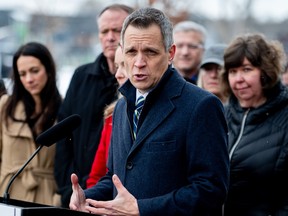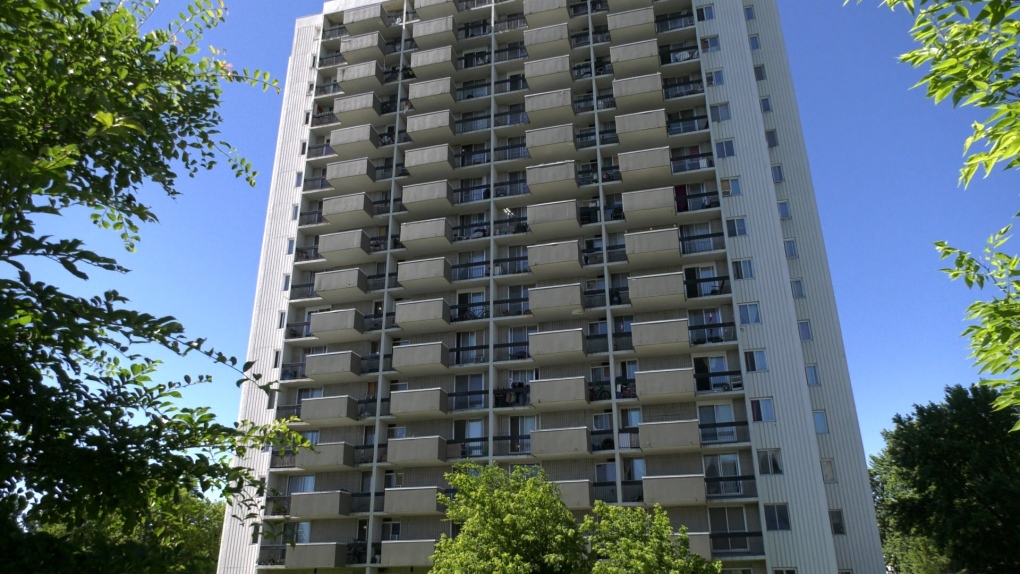You are using an out of date browser. It may not display this or other websites correctly.
You should upgrade or use an alternative browser.
You should upgrade or use an alternative browser.
Ottawa-Gatineau Housing Market
- Thread starter hoggytime
- Start date
Some more Toon Talk in the Citizen:
Author of the article:
Carolyn Whitzman, Toon Dreessen
Published Mar 21, 2024 • Last updated 3 hours ago • 4 minute read
 Mayor Mark Sutcliffe, flanked by MPs and other local politicians, announces the city's share from the federal housing funding Feb. 12. Photo by Spencer Colby /Postmedia
Mayor Mark Sutcliffe, flanked by MPs and other local politicians, announces the city's share from the federal housing funding Feb. 12. Photo by Spencer Colby /Postmedia
Last month, the federal government formally announced a commitment of $176.3 million to the City of Ottawa through its Housing Accelerator Fund (HAF). The funding will go to building 4,500 more affordable homes over the next three years.
This makes Ottawa one of nearly 20 Ontario cities to qualify for funding. Like other municipalities, the money is contingent on introducing a number of initiatives to make housing possible, including reforming municipal zoning to allow up to four homes on every residential lot by June, with enactment in 2025.
This agreement appears to be a step down from Ottawa’s 2022 Official Plan, which spoke of four-storey “low rise” zoning as a baseline minimum, with no limit on the number of units. More importantly, it falls well short of what is necessary to enable 151,000 more homes near transit and services by 2031, as the City of Ottawa pledged to the Ontario government, let alone enough to power the transition to energy-efficient, affordable and accessible communities that every recent Canadian report says is needed.
Federal Housing Minister Sean Fraser wasn’t at the Ottawa event. Instead, he was announcing a bold plan for non-market and affordable housing on government land. Fraser, with Prime Minister Justin Trudeau and Finance Minister Chrysta Freeland, was in Toronto in December 2023 when HAF pledged $471 million for a broad range of strategies, including acquiring rental buildings at risk of becoming unaffordable and building housing near rapid transit.
A month earlier, the City of Calgary received $228 million from HAF after it adopted a plan to build 3,000 affordable non-market homes a year. In May 2023, before HAF bids were open, the City of Ottawa received a report called Our City Starts with Home from the Alliance to End Homelessness Ottawa, endorsed by organizations ranging from supportive housing providers to the Board of Trade. The report recommended starting to build non-market housing on 18 mostly city-owned sites close to LRT. At the same time, a local housing advocacy group called Make Housing Affordable Ottawa released an action plan with very similar proposals.
If the City of Ottawa had built on those proposals as part of its HAF bid, it could have been in front of the pack instead of trailing behind.
Other Canadian cities are creating innovative approaches to housing. The City of Edmonton is forging ahead with a new zoning bylaw, adopted in October 2023, that includes zoning permitting the size, density and scale of development that our cities need (“as of right” zoning) with no parking minimums. The British Columbia government is scaling up affordable non-market and Indigenous housing on government land and reforming the building code to improve accessibility.
Meanwhile, Ottawa’s panicked approach to homelessness reveals a lack of forward thinking. Rather than temporary solutions, long-lasting action that comes from addressing root causes remains elusive. At a Jan. 16 Ottawa event attended by Minister Fraser, visitors from Finland discussed the virtual elimination of homelessness in their country. Numerous city councillors attended; the mayor and majority of councillors, including those representing rural and suburban wards, were nowhere to be seen.
Innovative, creative solutions were largely absent from the HAF submission. There was no consideration of support for sustainable buildings; nothing to address vast tracks of publicly owned land near transit that could have housing built on it today. Bureaucratic barriers for office-to-residential conversions should never have existed; A decade ago, a report was tabled to streamline planning; electronic permit applications have been in place in some cities for 10 years or more.
Why does it take HAF funding to make these changes today when the city could have done this at any time?
It has been 18 months since the last municipal election but we see no big ideas. Compare Ottawa to the creative and innovative changes being made within four months of Olivia Chow being elected as mayor of Toronto.
Ottawa has the talent for solutions but they never make it to the table (sometimes because of procurement rules) or get voted down by a fractured city council interested in low taxes and little else. There is a groundswell of interest in making a better Ottawa. A thriving urbanist book club, numerous formal and informal walking tours and grassroots advocacy organizations. Local residents meet, write and petition for change in everything from housing policy to environmental stewardship. Clearly, there is a desire for positive change. The time is now.
Carolyn Whitzman is an adjunct professor at the University of Ottawa and an expert adviser to the Housing Assessment Resource Tools project. Toon Dreessen is president of Architects DCA and a past president of the Ontario Association of Architects.
Whitzman and Dreessen: Why does Ottawa lag behind on housing solutions?
Other Canadian cities have innovated in order to ensure their residents are housed. Surely the nation's capital can do the same.Author of the article:
Carolyn Whitzman, Toon Dreessen
Published Mar 21, 2024 • Last updated 3 hours ago • 4 minute read

Last month, the federal government formally announced a commitment of $176.3 million to the City of Ottawa through its Housing Accelerator Fund (HAF). The funding will go to building 4,500 more affordable homes over the next three years.
This makes Ottawa one of nearly 20 Ontario cities to qualify for funding. Like other municipalities, the money is contingent on introducing a number of initiatives to make housing possible, including reforming municipal zoning to allow up to four homes on every residential lot by June, with enactment in 2025.
This agreement appears to be a step down from Ottawa’s 2022 Official Plan, which spoke of four-storey “low rise” zoning as a baseline minimum, with no limit on the number of units. More importantly, it falls well short of what is necessary to enable 151,000 more homes near transit and services by 2031, as the City of Ottawa pledged to the Ontario government, let alone enough to power the transition to energy-efficient, affordable and accessible communities that every recent Canadian report says is needed.
Federal Housing Minister Sean Fraser wasn’t at the Ottawa event. Instead, he was announcing a bold plan for non-market and affordable housing on government land. Fraser, with Prime Minister Justin Trudeau and Finance Minister Chrysta Freeland, was in Toronto in December 2023 when HAF pledged $471 million for a broad range of strategies, including acquiring rental buildings at risk of becoming unaffordable and building housing near rapid transit.
A month earlier, the City of Calgary received $228 million from HAF after it adopted a plan to build 3,000 affordable non-market homes a year. In May 2023, before HAF bids were open, the City of Ottawa received a report called Our City Starts with Home from the Alliance to End Homelessness Ottawa, endorsed by organizations ranging from supportive housing providers to the Board of Trade. The report recommended starting to build non-market housing on 18 mostly city-owned sites close to LRT. At the same time, a local housing advocacy group called Make Housing Affordable Ottawa released an action plan with very similar proposals.
If the City of Ottawa had built on those proposals as part of its HAF bid, it could have been in front of the pack instead of trailing behind.
Other Canadian cities are creating innovative approaches to housing. The City of Edmonton is forging ahead with a new zoning bylaw, adopted in October 2023, that includes zoning permitting the size, density and scale of development that our cities need (“as of right” zoning) with no parking minimums. The British Columbia government is scaling up affordable non-market and Indigenous housing on government land and reforming the building code to improve accessibility.
Meanwhile, Ottawa’s panicked approach to homelessness reveals a lack of forward thinking. Rather than temporary solutions, long-lasting action that comes from addressing root causes remains elusive. At a Jan. 16 Ottawa event attended by Minister Fraser, visitors from Finland discussed the virtual elimination of homelessness in their country. Numerous city councillors attended; the mayor and majority of councillors, including those representing rural and suburban wards, were nowhere to be seen.
Innovative, creative solutions were largely absent from the HAF submission. There was no consideration of support for sustainable buildings; nothing to address vast tracks of publicly owned land near transit that could have housing built on it today. Bureaucratic barriers for office-to-residential conversions should never have existed; A decade ago, a report was tabled to streamline planning; electronic permit applications have been in place in some cities for 10 years or more.
Why does it take HAF funding to make these changes today when the city could have done this at any time?
It has been 18 months since the last municipal election but we see no big ideas. Compare Ottawa to the creative and innovative changes being made within four months of Olivia Chow being elected as mayor of Toronto.
Ottawa has the talent for solutions but they never make it to the table (sometimes because of procurement rules) or get voted down by a fractured city council interested in low taxes and little else. There is a groundswell of interest in making a better Ottawa. A thriving urbanist book club, numerous formal and informal walking tours and grassroots advocacy organizations. Local residents meet, write and petition for change in everything from housing policy to environmental stewardship. Clearly, there is a desire for positive change. The time is now.
Carolyn Whitzman is an adjunct professor at the University of Ottawa and an expert adviser to the Housing Assessment Resource Tools project. Toon Dreessen is president of Architects DCA and a past president of the Ontario Association of Architects.
From OBJ. Note “The Ministry of Finance projects that Ottawa will grow by 650,000 people by 2046"
 David Sali
David Sali

Jason Burggraaf is executive director of the Greater Ottawa Home Builders’ Association.
The provincial government’s pledge this week to invest more than $1.8 billion to help build at least 1.5 million homes across Ontario by 2031 will be a welcome boost as Ottawa scrambles to address its housing shortage, a group representing the city’s biggest homebuilders says.
“Ottawa desperately needs new infrastructure to support home building for its growing population,” Patrick Daniels, president of the Greater Ottawa Home Builders’ Association and general manager of construction operations at Glenview Homes, said in a statement.
“The Ministry of Finance projects that Ottawa will grow by 650,000 people by 2046. This significant infrastructure investment is critical if we want enough service capacity to support the housing growth our future population will need.”
Premier Doug Ford announced the new funding Thursday at a news conference in Richmond Hill.
Ford said the province is creating a $1-billion program that will go towards building infrastructure such as roads, bridges and watermains for new houses.
He said his government is also more than quadrupling funding for its new Housing-Enabling Water Systems Infrastructure Fund to repair, rehabilitate and expand water, wastewater and stormwater projects from $200 million to $825 million over the next three years.
GOHBA executive director Jason Burggraaf praised the move, which was among the recommendations his group made during last year’s pre-budget consultations with the province.
“We are very pleased the government has taken this step,” Burggraaf said in a statement. “Without this kind of necessary infrastructure funding, there will be little positive impact on housing affordability in the areas the city has identified for growth.
“If we don’t have sufficient service capacity for things like sewers and stormwater, then intensification will not produce more affordable homes because there will be significant costs to upgrade or expand current infrastructure.”
Thursday’s announcement follows initiatives such as the province’s $1.2-billion Building Faster Fund, which was launched last year to reward cities for meeting or exceeding homebuilding targets, and the federal government’s $4-billion Housing Accelerator Fund, which aims to spur construction of new homes across Canada.
Last month, the federal government said it was giving the City of Ottawa $176 million from the fund to help ramp up housing construction in the city. In a news release, the feds said they expect the funding to fast-track more than 4,400 housing units in Ottawa over the next three years and more than 30,000 units over the next decade.
But some local developers said taxpayer dollars might be better spent on upgrading sewers and other infrastructure in neighbourhoods that aren’t equipped to handle additional density.
The Ontario government is tabling its budget next week. Burggraaf said he hopes the spending plan contains more measures aimed at funding additional housing infrastructure.
“It’s so important that we recognize the link between housing affordability and enhancing public infrastructure,” he said.
“Ensuring that the appropriate infrastructure is in place will address a critical factor in housing supply and affordability and give more Ottawa residents a reasonable opportunity to live in a home of their own.”
Local homebuilders praise province’s $1.8B funding injection for housing infrastructure

- March 22, 2024
- 3:42 PM
- ET

Jason Burggraaf is executive director of the Greater Ottawa Home Builders’ Association.
The provincial government’s pledge this week to invest more than $1.8 billion to help build at least 1.5 million homes across Ontario by 2031 will be a welcome boost as Ottawa scrambles to address its housing shortage, a group representing the city’s biggest homebuilders says.
“Ottawa desperately needs new infrastructure to support home building for its growing population,” Patrick Daniels, president of the Greater Ottawa Home Builders’ Association and general manager of construction operations at Glenview Homes, said in a statement.
“The Ministry of Finance projects that Ottawa will grow by 650,000 people by 2046. This significant infrastructure investment is critical if we want enough service capacity to support the housing growth our future population will need.”
Premier Doug Ford announced the new funding Thursday at a news conference in Richmond Hill.
Ford said the province is creating a $1-billion program that will go towards building infrastructure such as roads, bridges and watermains for new houses.
He said his government is also more than quadrupling funding for its new Housing-Enabling Water Systems Infrastructure Fund to repair, rehabilitate and expand water, wastewater and stormwater projects from $200 million to $825 million over the next three years.
GOHBA executive director Jason Burggraaf praised the move, which was among the recommendations his group made during last year’s pre-budget consultations with the province.
“We are very pleased the government has taken this step,” Burggraaf said in a statement. “Without this kind of necessary infrastructure funding, there will be little positive impact on housing affordability in the areas the city has identified for growth.
“If we don’t have sufficient service capacity for things like sewers and stormwater, then intensification will not produce more affordable homes because there will be significant costs to upgrade or expand current infrastructure.”
Thursday’s announcement follows initiatives such as the province’s $1.2-billion Building Faster Fund, which was launched last year to reward cities for meeting or exceeding homebuilding targets, and the federal government’s $4-billion Housing Accelerator Fund, which aims to spur construction of new homes across Canada.
Last month, the federal government said it was giving the City of Ottawa $176 million from the fund to help ramp up housing construction in the city. In a news release, the feds said they expect the funding to fast-track more than 4,400 housing units in Ottawa over the next three years and more than 30,000 units over the next decade.
But some local developers said taxpayer dollars might be better spent on upgrading sewers and other infrastructure in neighbourhoods that aren’t equipped to handle additional density.
The Ontario government is tabling its budget next week. Burggraaf said he hopes the spending plan contains more measures aimed at funding additional housing infrastructure.
“It’s so important that we recognize the link between housing affordability and enhancing public infrastructure,” he said.
“Ensuring that the appropriate infrastructure is in place will address a critical factor in housing supply and affordability and give more Ottawa residents a reasonable opportunity to live in a home of their own.”
Can you even imagine?!?!?!
Tenants in 16-floor apartment building in Ottawa's west-end served eviction notices

Katelyn Wilson
CTV News Ottawa Multi-Skilled Journalist
Contact
Published June 28, 2024 6:47 p.m. EDT
More than 100 people in Ottawa's west-end are in the process of receiving eviction notices to vacate their 50-year-old apartment building for renovations.
"A couple of days to make a decision is not fair," said a tenant who’s lived in the building for the past two years.
The tenant did not want us to use her name because she fears retribution from the building manager.
She tells CTV News Ottawa on Wednesday she received an N13 eviction notice along with a letter saying: "We understand that this announcement may come as a surprise, but we need to address the aging infrastructure. In order to ensure the safety and quality of living for all residents, we need to proceed with necessary renovations."
She adds the notice comes one week after she found out her building had been sold.
"I'm looking at the cheapest apartments, most places are $1,700 and up so that's a drastic increase," she said.
Right now, for one-bedroom apartment on Richmond Road, she pays around $1000, including utilities.
Her options are to terminate the lease and receive $5,000 or come back to the renovated unit and face a rent increase of hundreds of dollars a month. She says she has until Monday to decide.
"It's been very anxiety provoking, especially for some of us who are students and who are residing there. We are not sure what to do or where to go next," she said.
Advocates say renovictions are happening throughout the city at an alarming rate, leaving people with unaffordable rents in a competitive market.
"It is very hard to find somewhere else," said Bader Abu-Zahra, chair of the ACORN Vanier chapter. "We have seen that people are moving out and staying with their parents or relatives but really we don't know what's going to happen to them."
Rheal Brady is currently fighting his eviction notice in Vanier at an apartment he’s lived in for more than 20 years.
"It's hard for me, I don't know what tomorrow will bring," said Brady. "It's $1,500 for a bachelor, I don’t even have that."
On Richmond Road, many of the tenants in the 16-floor building have lived there for years.
"There are complex decisions to be made in balancing the need for renovations with the impact on tenants. While we sympathize with our residents, the decision to renovate the now 50-year-old apartments is crucial for ensuring the safety and quality for residents. Furthermore, we must also protect our investment and provide a better living environment for current and future resident. For those who oppose our approach, we would like to ask: 'How long should we wait to renovate our 50-year-old apartments?'" management tells CTV News in a statement.
While some tenants in the building are accepting their fate, others like the woman we spoke with are debating whether to stay and fight.
"I do feel like we are being thrown to the wolves and of course from a business perspective you want to consider making more money, but where is the humanity?" she said.
The city is in the process of exploring a renoviction bylaw that would make it harder to evict tenants in order to renovate and charge a higher rent. A report is expected to come to council in September.
RELATED IMAGES
1 / 1

A 16-floor apartment building in Ottawa's west end on Richmond Road on Friday, June 28, 2024 (Katelyn Wilson/CTV News Ottawa).
Tenants in 16-floor apartment building in Ottawa's west-end served eviction notices
Tenants in 16-floor apartment building in Ottawa's west-end served eviction notices

Katelyn Wilson
CTV News Ottawa Multi-Skilled Journalist
Contact
Published June 28, 2024 6:47 p.m. EDT
More than 100 people in Ottawa's west-end are in the process of receiving eviction notices to vacate their 50-year-old apartment building for renovations.
"A couple of days to make a decision is not fair," said a tenant who’s lived in the building for the past two years.
The tenant did not want us to use her name because she fears retribution from the building manager.
She tells CTV News Ottawa on Wednesday she received an N13 eviction notice along with a letter saying: "We understand that this announcement may come as a surprise, but we need to address the aging infrastructure. In order to ensure the safety and quality of living for all residents, we need to proceed with necessary renovations."
She adds the notice comes one week after she found out her building had been sold.
"I'm looking at the cheapest apartments, most places are $1,700 and up so that's a drastic increase," she said.
Right now, for one-bedroom apartment on Richmond Road, she pays around $1000, including utilities.
Her options are to terminate the lease and receive $5,000 or come back to the renovated unit and face a rent increase of hundreds of dollars a month. She says she has until Monday to decide.
"It's been very anxiety provoking, especially for some of us who are students and who are residing there. We are not sure what to do or where to go next," she said.
Advocates say renovictions are happening throughout the city at an alarming rate, leaving people with unaffordable rents in a competitive market.
"It is very hard to find somewhere else," said Bader Abu-Zahra, chair of the ACORN Vanier chapter. "We have seen that people are moving out and staying with their parents or relatives but really we don't know what's going to happen to them."
Rheal Brady is currently fighting his eviction notice in Vanier at an apartment he’s lived in for more than 20 years.
"It's hard for me, I don't know what tomorrow will bring," said Brady. "It's $1,500 for a bachelor, I don’t even have that."
On Richmond Road, many of the tenants in the 16-floor building have lived there for years.
"There are complex decisions to be made in balancing the need for renovations with the impact on tenants. While we sympathize with our residents, the decision to renovate the now 50-year-old apartments is crucial for ensuring the safety and quality for residents. Furthermore, we must also protect our investment and provide a better living environment for current and future resident. For those who oppose our approach, we would like to ask: 'How long should we wait to renovate our 50-year-old apartments?'" management tells CTV News in a statement.
While some tenants in the building are accepting their fate, others like the woman we spoke with are debating whether to stay and fight.
"I do feel like we are being thrown to the wolves and of course from a business perspective you want to consider making more money, but where is the humanity?" she said.
The city is in the process of exploring a renoviction bylaw that would make it harder to evict tenants in order to renovate and charge a higher rent. A report is expected to come to council in September.
RELATED IMAGES
1 / 1

A 16-floor apartment building in Ottawa's west end on Richmond Road on Friday, June 28, 2024 (Katelyn Wilson/CTV News Ottawa).
https://www.ottawa.ca/en/city-hall/...s-approve-plan-address-ottawas-housing-crisis
Huge news for Ottawa's Housing Crisis!
Published on
October 1, 2025
Council, committees and City Hall
Planning, development and construction
In a joint meeting today, the Finance and Corporate Services Committee and the Planning and Housing Committee approved a new comprehensive plan(link is external) to help deal with Ottawa’s housing crisis.
The plan builds on the work of the Housing Innovation Task Force, which brought City staff together with housing industry representatives to come up with ideas to help get more homes built faster. It also builds on changes the City has already made or is working to introduce, like speeding up planning reviews and allowing smart intensification, particularly near transit, through updates to the City’s zoning rules.
The bold strategy approved by Joint Committee will fundamentally change how the City approaches housing. The goal is to remove obstacles and use every available tool the City has to support building more homes. The plan focuses on areas where the City has the most control and includes five main objectives:
The Planning and Housing Committee met earlier in the day and approved a zoning amendment for two new multi-tower developments that promise more housing near transit.
Near Cyrville Station, the Committee approved zoning for the development of two 30-storey, mixed-use buildings at the northeast corner of Ogilvie Road and Cummings Avenue(link is external). The proposal is for more than 840 apartment units and ground-floor commercial space. A privately owned public space is also planned between the two towers, along with areas planned for trees, and a public walkway connecting to nearby Ken Steele Park. The amendment would change the site’s zoning to Transit Oriented Development and increase required bike parking, aligning with Official Plan policies that encourage more use of sustainable transportation and intensification near LRT.
Near Lincoln Fields Station, the committee approved zoning for the development of a 28-storey and a 30-storey building northeast of Richmond and Assaly roads(link is external). This proposal is for nearly 590 apartments and ground-floor commercial space. The amendment would increase permitted height and require that at least 10 per cent of the residential units have two bedrooms or more. It would also double the required amount of bike parking.
Tracking Ottawa’s housing approvals
To help address the housing crisis, City Council committed to providing home builders enough opportunities to build 151,000 quality market homes by 2031. The City tracks the progress of residential development in Ottawa and shares that data through an interactive housing approvals dashboard.
From Q1 2023 to Q4 2024, Council provided approvals for more than 52,000 new homes, putting applicants in a position to build roughly one third of the homes required to meet that 2031 goal. If Council approves the land-use permissions recommended today by the Planning and Housing Committee, applicants will be in a position to build another 1,432 new dwellings. Since the start of 2025, it is estimated this Committee has enabled the development of about 11,500 new dwellings.
City Council will consider the recommendations from today’s meetings on Wednesday, October 8.
Want a lighter way to stay informed? Sign up for the City News weekly round-up(link is external) newsletter for brief summaries and links to all the updates you may have missed.
Huge news for Ottawa's Housing Crisis!
Committees approve plan to address Ottawa’s housing crisis
Published on
October 1, 2025
Council, committees and City Hall
Planning, development and construction
In a joint meeting today, the Finance and Corporate Services Committee and the Planning and Housing Committee approved a new comprehensive plan(link is external) to help deal with Ottawa’s housing crisis.
The plan builds on the work of the Housing Innovation Task Force, which brought City staff together with housing industry representatives to come up with ideas to help get more homes built faster. It also builds on changes the City has already made or is working to introduce, like speeding up planning reviews and allowing smart intensification, particularly near transit, through updates to the City’s zoning rules.
The bold strategy approved by Joint Committee will fundamentally change how the City approaches housing. The goal is to remove obstacles and use every available tool the City has to support building more homes. The plan focuses on areas where the City has the most control and includes five main objectives:
- Simplify the rules and make approvals faster: The City will simplify local oversight and streamline its processes to reduce delays and help get housing projects started more quickly.
- Create a housing-friendly culture at City Hall: The City will look at all local planning rules through a “housing lens” to ensure efficiency and greater focus on getting more homes built.
- Be more flexible with fees and charges: The City will temporarily lower some costs for builders to help them start projects now, instead of waiting for better market conditions.
- Better support affordable housing: The City will proactively prepare City-owned land for affordable housing projects and will create a 10-year housing roadmap to guide this work to help overcome the high building costs and limited funding that have slowed affordable housing.
- Build more homes near transit: The City will encourage new housing near public transit, with options for different budgets and family sizes to promote walkable vibrant neighborhoods.
- Reducing Community Benefits charges for five years
- Deferring collection of Development Charges until occupancy
- Allowing for reimbursement of additional fees for non-profit affordable housing projects
- Using pre-set building designs to allow expedited building permits
- Deferring, reducing or waiving select Cash-in-Lieu of Parkland (CILP) charges for 18 months, while the City completes a review of its CILP policy
The Planning and Housing Committee met earlier in the day and approved a zoning amendment for two new multi-tower developments that promise more housing near transit.
Near Cyrville Station, the Committee approved zoning for the development of two 30-storey, mixed-use buildings at the northeast corner of Ogilvie Road and Cummings Avenue(link is external). The proposal is for more than 840 apartment units and ground-floor commercial space. A privately owned public space is also planned between the two towers, along with areas planned for trees, and a public walkway connecting to nearby Ken Steele Park. The amendment would change the site’s zoning to Transit Oriented Development and increase required bike parking, aligning with Official Plan policies that encourage more use of sustainable transportation and intensification near LRT.
Near Lincoln Fields Station, the committee approved zoning for the development of a 28-storey and a 30-storey building northeast of Richmond and Assaly roads(link is external). This proposal is for nearly 590 apartments and ground-floor commercial space. The amendment would increase permitted height and require that at least 10 per cent of the residential units have two bedrooms or more. It would also double the required amount of bike parking.
Tracking Ottawa’s housing approvals
To help address the housing crisis, City Council committed to providing home builders enough opportunities to build 151,000 quality market homes by 2031. The City tracks the progress of residential development in Ottawa and shares that data through an interactive housing approvals dashboard.
From Q1 2023 to Q4 2024, Council provided approvals for more than 52,000 new homes, putting applicants in a position to build roughly one third of the homes required to meet that 2031 goal. If Council approves the land-use permissions recommended today by the Planning and Housing Committee, applicants will be in a position to build another 1,432 new dwellings. Since the start of 2025, it is estimated this Committee has enabled the development of about 11,500 new dwellings.
City Council will consider the recommendations from today’s meetings on Wednesday, October 8.
Want a lighter way to stay informed? Sign up for the City News weekly round-up(link is external) newsletter for brief summaries and links to all the updates you may have missed.
Last edited:




